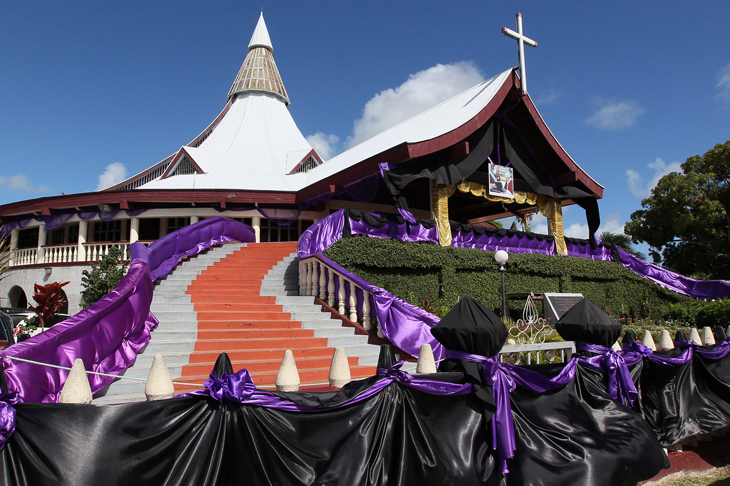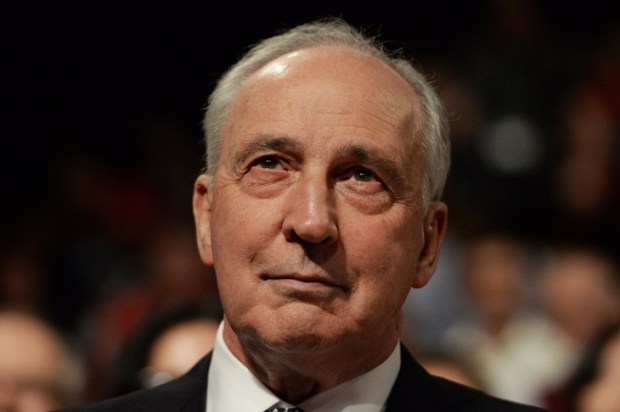‘I cannot believe in this election that there is a discussion even under way that gay people will go to hell,’ said Mr Shorten, just days before Australian voters used the ballot box to send his political aspirations in a similar direction.
Mr Shorten was referring to star Wallabies full-back Israel Folau, an evangelical Christian of Tongan descent, who was sacked by Rugby Australia for the sin of expressing his unfashionable religious convictions.
Bizarrely, it was left to conservative Liberal Senator Eric Abetz to stand up for Mr Folau’s ‘rights at work’ — not the party of the workers or the trade unions —and refer the case to the Fair Work Ombudsman this week. Yet as the Reverend Dr Hedley Fihaki of the Assembly of Confessing Congregations of the Uniting Church in Australia, who is also of Tongan descent put it, ‘Mr Folau’s situation is affecting all of us.’
Mr Shorten has a long list of scapegoats that he blames for his unsurprising electoral loss, but religion figures only as a source of Biblical metaphors — corporate ‘leviathans’ and a financial ‘behemoth’ are as close as he comes to recognising that Labor’s unholy contempt for people of faith in the ethnic community has cost the party another election.
Labor has long assumed that it has the migrant vote in the bag. Yet at the 2016 election it was already apparent, ironically, that it was socially conservative ethnic Australians who saved Prime Minister Turnbull from being a one-term wonder.
While the government lost a swag of seats in western Sydney, two of the most ethnically diverse, Banks and Reid, bucked the trend. In both, around half the residents were born overseas, with large Chinese communities and strong support for conservative minor parties.
In Reid, Liberal Craig Laundy held on with a margin of 4.7 per cent thanks to strong preference flows from Kang Ju, of the Reverend Fred Nile’s Christian Democratic Party, which won 4.1 per cent of the vote and Marylou Carter, of Family First, who won 2.3 per cent.
In Banks, Liberal candidate David Coleman won with a margin of 1.4 per cent, helped by preference flows from Sharon Wu of Family First who won 1.8 per cent of the vote, and from Christian Democratic Party candidate, Greg Bondar, who more than doubled the party’s vote, to 5.3 per cent.
The standout however was Chisholm in Melbourne’s aspirational eastern suburbs, the only seat the Liberal party won from Labor in 2016. Almost 44 per cent of residents were born overseas and the most common ancestry – almost 20 per cent of residents — is Chinese.
Julia Banks won with a swing of 2.8 per cent and strong preference flows from Family First, which got 2.5 per cent of the vote, and Rise Up Australia, which secured a vote of 1.2 per cent.
A week after the 2016 election victory, Gladys Liu, the Liberal party’s communities engagement committee chairwoman for Victoria proudly took credit for the role she played in Ms Banks’s victory, recounting how she used Chinese social media WeChat to reach out to voters and explaining, to the horror of Guardian progressives, that Chinese people come to Australia because they want good things for their children not for them to be ‘destroyed’ by same-sex, transgender, intergender, cross-gender concepts. ‘To them, this is just ridiculous rubbish,’ she said, as if she’d just taken a swig of truth serum.
Ms Banks, who wrote a passionate op-ed in support of same-sex marriage, loudly rejected the suggestion that she benefitted from Ms Liu’s campaign and called her comments ‘abhorrent’, but Labor operatives bitterly acknowledged Ms Liu’s success.
‘We didn’t have a WeChat strategy,’ they confessed, although they dismissed Ms Liu’s campaign against Safe Schools and same-sex marriage as ‘scaremongering.’ In 2019 it would be different, they said.
When Ms Banks resigned from the Liberal party in disgust at Mr Turnbull losing the prime ministership she said, ‘I have always listened to the people who elected me’. Perhaps, but it was Ms Liu and Mr Morrison, both evangelical Christians who oppose same-sex marriage that the voters of Chisholm chose for MP and PM.
If Ms Banks was blind to the social conservativism of her constituents, former Labor senator Sam Dastyari was not, pondering how Labor could reconcile a progressive political agenda with a socially conservative, religious, ethnic base, whose heartland is western Sydney. He pointed out that in the 2017 plebiscite on same-sex marriage, the highest Yes vote (84 per cent in inner city Sydney) and the highest No vote (74 per cent in Blaxland in the western suburbs) were both safe Labor seats only 10 km apart. But in Blaxland, only 14 per cent of residents said they had no religion, in Sydney it was 43 per cent.
Yet Labor went into the 2019 election inflaming fears in relation to the autonomy afforded to religious schools and hospitals to promote their values, and the threat to their funding if they didn’t toe the line on theories of gender and sexuality. The biggest threat however was to the simple right of individuals to live in accordance with their religious beliefs.
Labor has shown no tolerance for religious views that deviate from its aggressively secular orthodoxy and is openly hostile to traditional religious beliefs. Labor Senator Penny Wong even demanded Mr Morrison disendorse candidates who oppose same-sex marriage, a view held by almost four in ten Australians. That made the choice for religious voters easy.
The result was dramatic. Labor suffered a backlash in at least 12 western Sydney seats, including Banks, Blaxland, Chifley, Fowler, Greenway, Mitchell, Parramatta, Werriwa, and Watson, with an average swing of 3.3 per cent. It lost Lindsay to the Liberals on a swing of 6.5 per cent and almost lost Macquarie.
The worst swing was in Chifley with a swing of over 6.6 percent. Chris Bowen’s safe seat of McMahon suffered a swing of more than 5.5 per cent, prompting him to admit that religious Australians felt Labor had abandoned them. Others, including Opposition leader Anthony Albanese have said Labor must welcome people of faith.
Yet for all that, publicly defending the right of Israel Folau to be an evangelical Christian appears to be a bridge too far.
As long as that remains the case, Labor will struggle to win the trust of religious voters and to win a federal election.
Got something to add? Join the discussion and comment below.
Get 10 issues for just $10
Subscribe to The Spectator Australia today for the next 10 magazine issues, plus full online access, for just $10.
You might disagree with half of it, but you’ll enjoy reading all of it. Try your first month for free, then just $2 a week for the remainder of your first year.














Comments
Don't miss out
Join the conversation with other Spectator Australia readers. Subscribe to leave a comment.
SUBSCRIBEAlready a subscriber? Log in